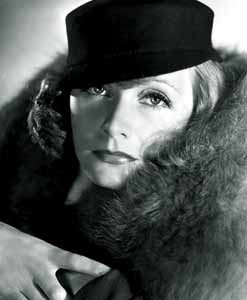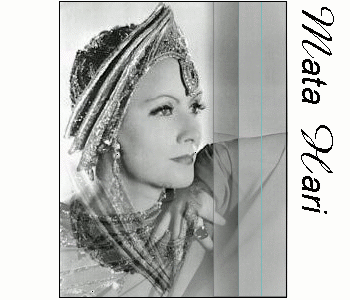a biography of Greta Garbo
Sweden: The Early Years
1905-1924
Greta Garbo was born Greta Lovisa Gustafsson on September 18, 1905. Garbo was born in Stockholm to poor parents. She was 14 when her father died, leaving the family destitute. Consequently, Greta was forced to leave school and go to work, first as a lather girl in a barbershop, then as a clerk in a department store.
The store also used her for her modeling abilities for newspaper ads. She had no film aspirations until she appeared in an advertising short at that same department store while she was still a teenager. This led to another short film when Eric Petscher, a comedy director, saw the film. He gave her a small part in the film, Peter The Tramp (1920). From 1922 to 1924 she studied at the Royal Dramatic Theatre, Stockholm. During that period met Mauritz Stiller, the foremost Swedish director, who gave her an important role in Gφsta Berlings Saga (1924; "The Story of Gφsta Berling"), gave her the stage name Greta Garbo, and trained her in cinema-acting techniques.
The store also used her for her modeling abilities for newspaper ads. She had no film aspirations until she appeared in an advertising short at that same department store while she was still a teenager. This led to another short film when Eric Petscher, a comedy director, saw the film. He gave her a small part in the film, Peter The Tramp (1920). From 1922 to 1924 she studied at the Royal Dramatic Theatre, Stockholm. During that period met Mauritz Stiller, the foremost Swedish director, who gave her an important role in Gφsta Berlings Saga (1924; "The Story of Gφsta Berling"), gave her the stage name Greta Garbo, and trained her in cinema-acting techniques.
The Hollywood Years
1925-1941
In 1925, when Stiller went to the United States to work for Metro-Goldwyn-Mayer, he insisted that Garbo be given a contract also. In all, she appeared in 27 films (two in Sweden, one in Germany, and the remainder in Hollywood); the most important of her silent films were The Torrent (1926), Flesh and the Devil (1927) and Love (1927), both with the popular leading man John Gilbert, whose name was linked with hers in a much-publicized romance.
Anna Christie (1930) was the talking picture in which her rich, low voice was first heard. It was a great success, although Garbo herself despised her performance. It earned her the first of her four Academy Award nominations for best actress. That same year, Garbo earned another Academy Award nomination for her role in Romance.
Garbo was her most seductive playing the WWI spy in Mata Hari (1932). So much so that the censors complained of the revealing outfit shown on the movie poster. Her next film that year was Grand Hotel, with one of the first all star casts. The film earned MGM it’s second Best Picture Oscar.
After almost 2 years off the screen, Garbo signed a new MGM contract granting her almost total control over her films. She exercised that control by getting leading man Laurence Olivier fired from her film, Queen Christina (1934), and forcing Mayer to replace him with former co-star and lover John Gilbert, who’s career had faltered since the coming of sound.
In 1935, David O. Selznick wanted Garbo cast as the dying heiress in Dark Victory, but she insisted on a screen version of Leo Tolstoy's classic novel, Anna Karenina. She had already starred in a silent version, Love (1927), with John Gilbert.
Many have called Garbo's performance as the doomed coutesan in Camille (1937) the finest ever recorded on film. Some fans even claimed that during the star's climatic death scene they saw her soul leave her body. Not surprisingly, this role earned her a third Academy Award nomination.
Director Ernst Lubitsch’s finest work of the 1930s was the classic Ninotchka (1939). It starred Garbo in a comedy! "Garbo Laughs" said the advertisements. And she does, charmingly. Ninotchka earned Garbo the last of her four Academy Award nominations.
At age 36, after the flop of her film, Two Faced Woman (1941), Garbo withdrew from the entertainment field and retired to a secluded life in New York City. In 1954 she was awarded a special Academy Award for unforgettable performances.
1925-1941
In 1925, when Stiller went to the United States to work for Metro-Goldwyn-Mayer, he insisted that Garbo be given a contract also. In all, she appeared in 27 films (two in Sweden, one in Germany, and the remainder in Hollywood); the most important of her silent films were The Torrent (1926), Flesh and the Devil (1927) and Love (1927), both with the popular leading man John Gilbert, whose name was linked with hers in a much-publicized romance.
Anna Christie (1930) was the talking picture in which her rich, low voice was first heard. It was a great success, although Garbo herself despised her performance. It earned her the first of her four Academy Award nominations for best actress. That same year, Garbo earned another Academy Award nomination for her role in Romance.
Garbo was her most seductive playing the WWI spy in Mata Hari (1932). So much so that the censors complained of the revealing outfit shown on the movie poster. Her next film that year was Grand Hotel, with one of the first all star casts. The film earned MGM it’s second Best Picture Oscar.
After almost 2 years off the screen, Garbo signed a new MGM contract granting her almost total control over her films. She exercised that control by getting leading man Laurence Olivier fired from her film, Queen Christina (1934), and forcing Mayer to replace him with former co-star and lover John Gilbert, who’s career had faltered since the coming of sound.
In 1935, David O. Selznick wanted Garbo cast as the dying heiress in Dark Victory, but she insisted on a screen version of Leo Tolstoy's classic novel, Anna Karenina. She had already starred in a silent version, Love (1927), with John Gilbert.
Many have called Garbo's performance as the doomed coutesan in Camille (1937) the finest ever recorded on film. Some fans even claimed that during the star's climatic death scene they saw her soul leave her body. Not surprisingly, this role earned her a third Academy Award nomination.
Director Ernst Lubitsch’s finest work of the 1930s was the classic Ninotchka (1939). It starred Garbo in a comedy! "Garbo Laughs" said the advertisements. And she does, charmingly. Ninotchka earned Garbo the last of her four Academy Award nominations.
At age 36, after the flop of her film, Two Faced Woman (1941), Garbo withdrew from the entertainment field and retired to a secluded life in New York City. In 1954 she was awarded a special Academy Award for unforgettable performances.
The Final Years
1942 - 1990
After World War II, Greta, by her own admission, felt that the world had changed perhaps forever and she retired, never again to face the camera. She would work for the rest of her life to perpetuate the Garbo mystique. Her films, she felt, had their proper place in history and would gain in value. She abandoned Hollywood and moved to New York City. She would jet-set with some of the world's best known personalities such as Aristotle Onassis and others. She spent time gardening flowers and vegetables. In 1954, Greta was given a special Oscar for past unforgettable performances. She even penned her biography in 1990. On April 15, 1990, Greta died of natural causes in New York and with it the "Garbo Mystique". She was 84.
After World War II, Greta, by her own admission, felt that the world had changed perhaps forever and she retired, never again to face the camera. She would work for the rest of her life to perpetuate the Garbo mystique. Her films, she felt, had their proper place in history and would gain in value. She abandoned Hollywood and moved to New York City. She would jet-set with some of the world's best known personalities such as Aristotle Onassis and others. She spent time gardening flowers and vegetables. In 1954, Greta was given a special Oscar for past unforgettable performances. She even penned her biography in 1990. On April 15, 1990, Greta died of natural causes in New York and with it the "Garbo Mystique". She was 84.
MAY THE FORCE BE WITH YOU











Δεν υπάρχουν σχόλια:
Δημοσίευση σχολίου